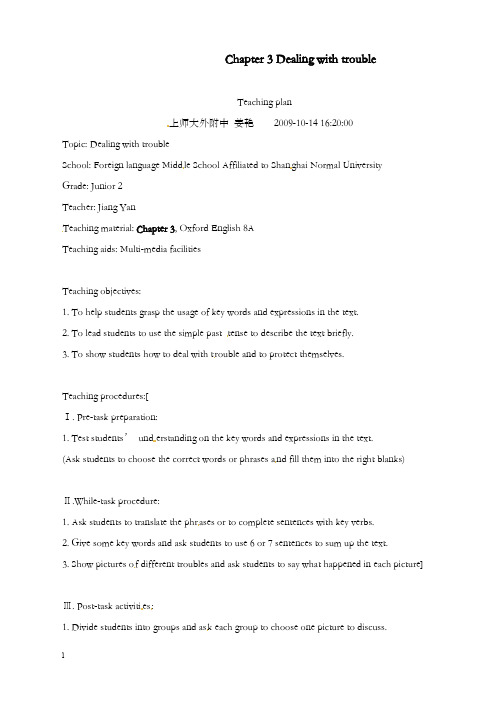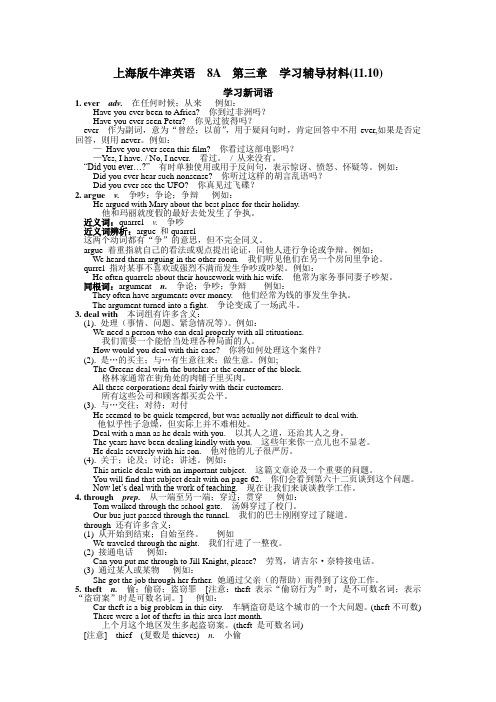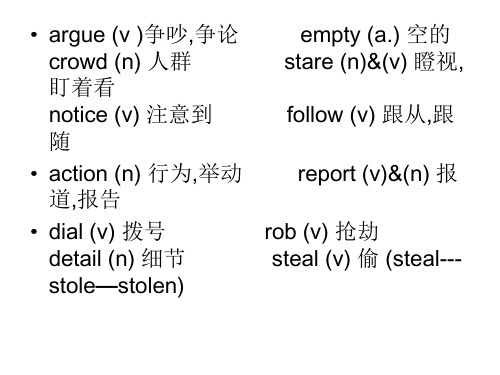阅读Dealing with trouble
- 格式:ppt
- 大小:2.59 MB
- 文档页数:11

Chapter 3 Dealing with troubleTeaching plan上师大外附中姜艳2009-10-14 16:20:00Topic: Dealing with troubleSchool: Foreign language Midd le School Affiliated to Shan ghai Normal University Grade: Junior 2Teacher: Jiang YanTeaching material: Chapter 3, Oxford English 8ATeaching aids: Multi-media facilitiesTeaching objectives:1. To help students grasp the usage of key words and expressions in the text.2. To lead students to use the simple past tense to describe the text briefly.3. To show students how to deal with trouble and to protect themselves.Teaching procedures:[Ⅰ. Pre-task preparation:1. Test students’und erstanding on the key words and expressions in the text.(Ask students to choose the correct words or phrases a nd fill them into the right blanks)Ⅱ.While-task procedure:1. Ask students to translate the phr ases or to complete sentences with key verbs.2. Give some key words and ask students to use 6 or 7 sentences to sum up the text.3. Show pictures of different troubles and ask students to say what happened in each picture]Ⅲ. Post-task activiti es:1. Divide students into groups and as k each group to choose one picture to discuss.Topic: If you are in one of the troubles, how will you deal with it?[2. Invite students to share the trouble they met and give some suggestions.Assignment:1. Read the text fluently.2. Write a diary about a trouble you met in the past (about 60 words).。

Dealing with trouble(Oxford English 8A Unit 3)Students: Class 1 Grade 7, Gaoqiao-Donglu School Teacher: Yu WenruiI.Material analysisThe teaching material is about story learning. Students need to be clear about 6 ele ments of a story, find the clue of story development, and analyze the character’s q ualities so that they can cultivate the good habit of reading for information between lines and especially information after lines. Besides, they should enhance the ability of using the simple past tense.II.Class analysisThe material is for 8th graders, but I choose 7th graders to have a try. I guess my class may have difficulty in predicting especially in analyzing the character in the s tory. But I will guide them to learn to read and enjoy fun of reading.III.Teaching Objectives:1.Language objectives:By the end of this lesson, students will improve their skill of using the simple past tense to describe and express.2.Ability objectives:Students will improve reading comprehension skills by analyzing six elements of a story and finding the developing clue of a story.3.Emotion objective:Students will strengthen awareness of social responsibility-to help someone in trouble in a wise and efficient way and learn self protection as well.IV.Teaching focus and difficulty1.How to find the clue of story development2.How to analyze qualities of the character by observing detailsV.Research points1.提问激发思维碰撞2.学习方式自主合作3.教学效益得到优化C Today my dad and l were waiting for the ferry when suddenly we heard a big argument. Two women tourists and a young man were shouting at each other. The man held out a bag, and showed everyone that it was empty.A The crowd stared at the three people. No one knew what was happening.My dad moved through the crowd and said quietly to one of the women, ‘What’s going on?’‘They stole my friend’s purse,’ said the woman. ‘We were in the bookshop, buying postcards. Three young men started talking to us. Suddenly my friend noticed that he r purse was gone. Two of the men ran away. We followed this man here.’D Then the gates opened. The man hurried aboard, and the two womentourists went after him.‘Wait,’ said my dad. ’Let’s take the next ferry.’This was strange. Was my dad afraid of that man? l followed him to a shop nearby.B He picked up the phone and quickly dialed 110. ‘I want to report a theft. The man is on No. 3 Ferry now It just left a few minutes ago. Please meet the ferry.’ He gav e some more details, and then put the phone down.E We took the next ferry. As we got off, we saw the two women tourists and four policemen standing around the man and he looked worried.‘Well done, Dad,’ said as we walked by. Dad just smiled.。

上海版牛津英语8A 第三章学习辅导材料(11.10)学习新词语1. ever adv.在任何时候;从来例如:Have you ever been to Africa? 你到过非洲吗?Have you ever seen Peter? 你见过彼得吗?ever 作为副词,意为“曾经;以前”,用于疑问句时,肯定回答中不用ever,如果是否定回答,则用never。
例如:—Have you ever seen this film? 你看过这部电影吗?—Yes, I have. / No, I never. 看过。
/ 从来没有。
“Did you ever…?” 有时单独使用或用于反问句,表示惊讶、愤怒、怀疑等。
例如:Did you ever hear such nonsense? 你听过这样的胡言乱语吗?Did you ever see the UFO? 你真见过飞碟?2. argue v.争吵;争论;争辩例如:He argued with Mary about the best place for their holiday.他和玛丽就度假的最好去处发生了争执。
近义词:quarrel v. 争吵近义词辨析:argue 和quarrel这两个动词都有“争”的意思,但不完全同义。
argue 着重指就自己的看法或观点提出论证,同他人进行争论或争辩。
例如:We heard them arguing in the other room. 我们听见他们在另一个房间里争论。
qurrel 指对某事不喜欢或强烈不满而发生争吵或吵架。
例如:He often quarrels about their housework with his wife. 他常为家务事同妻子吵架。
同根词:argument n. 争论;争吵;争辩例如:They often have arguments over money. 他们经常为钱的事发生争执。

初二英语Chapter Three: Dealing with trouble: reading某某牛津版【本讲教育信息】一. 教学内容:Chapter Three: Dealing with trouble: reading[学习过程]一、重点句子:1.Today my father and I were waiting for the ferry .今天我爸爸和我正在等渡轮。
在此句中所用的时态是过去进行时,这一时态的基本结构是was/were+ v.-ing 形式。
它与一般过去时态不同。
一般过去时态用于陈述过去的事实, 而过去进行时态用于描述过去某个时间里正在发生的动作,句中常有具体的表示过去的时间点或时间段。
I was watching the World Cup Final at 7 o’clock yesterday evening.昨晚7点,我正在看世界杯决赛。
He watched the World Cup Final yesterday evening. 昨晚他看了世界杯决赛。
这一时态用于描述过去某一时刻正在发生的动作。
而现在进行时描述的是目前正在发生的动作。
I was having my breakfast then. 那时我正在吃早餐。
I’m having my breakfast now.现在我正在吃早餐。
You were sleeping then. 当时你正在睡觉。
They are sleeping now. 现在他们正在睡觉。
ait 是一个不及物动词,后接宾语时,必须用短语wait for.Please wait here. He will be back in a minute. 请等在这儿吧。
他一会儿就会回来。
We should wait for help. 我们应该等待帮忙。
Will you wait for me for a while?你等我一会好么?2. This afternoon we heard a big argument. 今天下午我们听见一场大声的争论。


Chapter 3 Dealing with trouble一. 教学内容:Chapter 3: Dealing with trouble[具体过程]一. 重点句子:1. We followed this man here.我们跟着这个人到了这。
(1)句中follow表示“跟踪”,用作及物动词,表示“跟踪某人到某地”用follow sb. to + 地点名词,如果表示地点的词是副词,则不用介词to。
如:The policeman followed the thief to the train station.警察跟踪那个小偷到了火车站。
You must follow him everywhere around the clock.你必须24小时跟踪他,他到哪儿,你跟踪到哪儿。
The man followed her home.那个人跟踪她一直到了家里。
(2)follow还可以表示“跟着,跟随,追随”。
如:Don’t follow me around.别老跟着我。
The British fans follow their favourite football team everywhere.英国球迷喜爱的球队走到哪儿,那帮球迷就跟到哪儿。
Some terrorists follow Laden. 有些恐怖分子追随拉登。
2. The two tourists went after him.两个游客跟着他。
句中went after him 表示“跟着他”。
与一些动词搭配时,介词after表示“以……为追赶(或追求,纠缠,搜寻)的目标”。
如:He goes after money. 他追逐金钱。
The police are running after the murderer. 警方正在追捕那个杀人犯。
What are you after? 你追求什么?3. Can I use your phone? 我能用一下么?Can I…?是一种请求许可的用语。